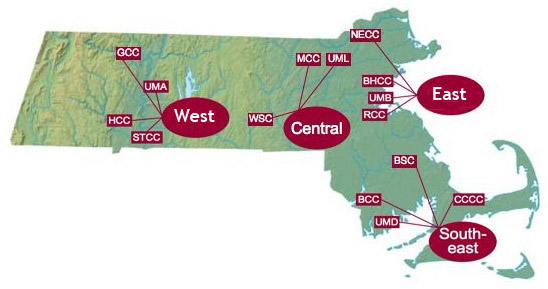Commonwealth Alliance for Information Technology Education (CAITE)
News and Events |
CAITE HighlightsCAITE expands to central Massachusetts, grows to 15 campusesAMHERST, Mass. – UMass Amherst has received funding to expand a project to bring more women and underrepresented minorities into information technology (IT) and computing education and careers throughout Massachusetts. The National Science Foundation (NSF) recently awarded a $1.9 million grant to extend the Commonwealth Alliance for Information Technology Education (CAITE) for an additional 2 years and to add 6 additional institutions to the existing alliance. “This new funding allows us to expand this project at a time when many people are choosing to pursue education at our public institutions and invest in their own economic futures,” said Rick Adrion, CAITE director and professor of computer science at UMass Amherst. “Information technology remains a vital industry in Massachusetts, and IT is crucial to almost all industry sectors. Employers are seeking workers that represent the diversity of the population.” CAITE works to raise awareness of and improve preparation for information technology and computing careers and educational pathways, especially among groups that are underrepresented in the Massachusetts innovation economy; that is, economically, academically, and socially disadvantaged residents. Since CAITE began its work less than two years ago, approximately 5,000 students and educators have participated in more than 30 activities—from career days and college fairs for high school students, to workshops for teachers and guidance counselors. The new grant funding offers the unique opportunity for CAITE to work with more than half of Massachusetts’ public campuses, including three-fifths of the community colleges, to expand the educational pipeline and create clearer and more nurturing paths from high school, through community college, and into four-year programs. These efforts will dovetail with the Massachusetts Department of Higher Education’s efforts to institute the MassTransfer program and better community college transfer options. “The Massachusetts economy has depended on keeping out-of-state students in the Commonwealth after graduation and attracting degree-holding immigrants, but these numbers are declining rapidly,” said Adrion. “That’s why we decided to focus on resident students attending public institutions—they tend to stay in state in larger numbers after graduation.” Community colleges are the centerpiece of CAITE because of the central role they play in reaching underserved populations and in acting as a gateway to careers and further higher education. “Community colleges offer a real opportunity to bring highly capable people into information technology education and the workforce who, for a variety of reasons, have been prevented from participating fully in the knowledge economy,” said Adrion. CAITE outreach extends into four Massachusetts regions that have high percentages of families living below the poverty level, minorities and immigrants, and low percentages of students graduating from high school, going to four-year colleges, and participating in the knowledge economy. These regions are eastern (Boston area), southeastern (Fall River, Dartmouth, and the Cape), western, and central Massachusetts (Lowell, Lawrence, and Worcester). CAITE began in March 2007 with support of an initial 3-year grant of $1.9 million from the NSF’s Broadening Participation in Computing (BPC) program, which aims to significantly increase the number of U.S. citizens and permanent residents receiving post-secondary degrees in the computing disciplines, with an emphasis on students from communities with longstanding under-representation in computing: women, persons with disabilities, and minorities. The project leadership includes Adrion, as well as and Lori Clarke, professor of computer science, and Jane Fountain, professor of political science, both of UMass Amherst; Deborah Boisvert, director of the Boston Area Advanced Technological Education Connections (BATEC), and Priscilla Grocer, chair, department of computer information systems, Bristol Community College. Computer science and information technology faculty members at each alliance partner campus lead work on their own campuses. CAITE builds on partnerships with the Commonwealth Information Technology Initiative (CITI), BATEC, regional Louis Stokes Alliances for Minority Participation and Alliances for Graduate Education and the Professoriate (AGEP) programs, also funded by NSF, and other initiatives focused on information technology education and science, technology, engineering, and math (STEM) pipeline issues. CAITE is one of 10 NSF BPC Alliances across the nation, each of which is a broad partnership of institutions and organizations that focus on particular strategies and/or groups underrepresented in computing. CAITE is one of two statewide alliances and the only alliance that focuses on community colleges as a gateway to IT education for many Massachusetts students.
|






